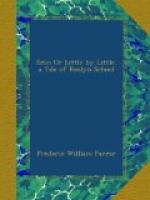“When did he say this?”
“On Friday afternoon.”
Upton had given his evidence with great reluctance, although, being simply desirous that the truth should come out, he concealed nothing that he knew. He brightened up a little when Russell rose to cross-examine him.
“Have you ever known Williams to do any mean act?”
“Never.”
“Do you consider him a boy likely to have been guilty on this occasion?”
“Distinctly the reverse. I am convinced of his innocence.”
The answer was given with vehement emphasis, and Eric felt greatly relieved by it.
One or two other boys were then called on as witnesses to the great agitation which Eric had shown during the investigation in the school-room, and then Gibson, who was a sensible, self-contained fellow, said, “I have now done my part. I have shown that the accused had a grudge against Mr. Gordon at the time of the occurrence, and had threatened to be revenged on him; that he was the last boy in the room during the time when the offence must have been committed; that the handwriting is known to resemble his, and that the ink and wafers employed were such as he, and he only, was known to possess. In addition to all this, his behavior, when the matter was first publicly noticed, was exactly such as coincides with the supposition of his guilt. I think you will all agree in considering these grounds of suspicion very strong; and leaving them to carry their full weight with you, I close the case for the prosecution.”
The school listened to Gibson’s quiet formality with a kind of grim and gloomy satisfaction, and when he had concluded, there were probably few but Eric’s own immediate friends who were not fully convinced of his guilt, however sorry they might be to admit so unfavorable an opinion of a companion whom they all admired.
After a minute or two, Russell rose for the defence, and asked, “Has Williams any objection to his desk being brought, and any of its contents put in as evidence?”
“Not the least; there is the key, and you will find it in my place in school.”
The desk was brought, but it was found to be already unlocked, and Russell looked at some of the note-paper which it contained. He then began—“In spite of the evidence adduced, I think I can show that Williams is not guilty. It is quite true that he dislikes Mr. Gordon, and would not object to any open way of showing it; it is quite true that he used the expressions attributed to him, and that the ink and wafers are such as may be found in his desk, and that the handwriting is not unlike his. But is it probable that a boy intending to post up an insult such as this, would do so in a manner, and at a time so likely to involve him in immediate detection, and certain punishment? At any rate, he would surely disguise his usual handwriting. Now, I ask any one to look at this paper, and tell me whether it is not clear, on the contrary, that these letters were traced slowly and with care, as would be the case with an elaborate attempt to imitate?” Russell here handed the paper to the jury, who again narrowly examined it.




